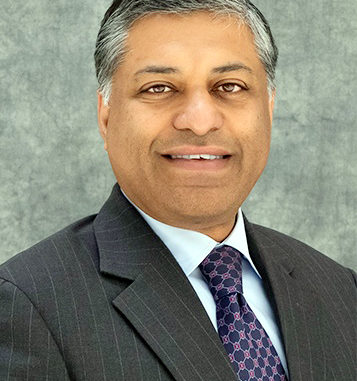
I.S. Saluja
WASHINGTON (TIP): President Joe Biden nominated Indian American Rahul Gupta, the top health official at maternal-and-child advocacy group March of Dimes, as the nation’s top drug policy official, the White House announced, July 13. Gupta, a primary-care doctor who led Biden’s transition efforts for the drug policy office, would be the first Indian American and as the physician to serve as drug czar if confirmed by the Senate, the reports said.
“President Biden’s nomination of Dr. Rahul Gupta to be the first physician ever to lead the White House Office of National Drug Control Policy is another historic step in the Administration’s efforts to turn the tide of our nation’s addiction and overdose epidemic,” a White House statement said.
“Dr. Gupta brings firsthand experience as a medical doctor and public health official using evidence-based strategies to address the overdose epidemic in West Virginia,” the statement added. “We hope he will be confirmed by the Senate soon.” The three-decade-old drug policy office — which was created with the support of Biden, who coined the term “drug czar” in 1982 — coordinates national policy around fighting substance-use disorders, including the response to an opioid crisis that has worsened during the pandemic, the report noted.
Gupta has publicly warned that the pandemic probably exacerbated addiction-related public health problems, citing the shift from in-person care.
“When those services are either shut down or turned into virtual services, more people can be denied those services and that only leads to more suffering,” Gupta told Sinclair Broadcast Group in a news report broadcast this week.
Gupta, an ally of Sen. Joe Manchin III has been favored for months to take the role of drug czar, but he faced resistance from some anti-addiction advocates, who argued he did too little to ensure safe-needle exchange during a 2017 HIV outbreak in West Virginia, the report said.
Gupta would replace Regina LaBelle, who has served as the office’s acting director since January.
West Virginia Gov. Jim Justice said Tuesday that Dr. Rahul Gupta’s nomination can only help the state.
“During his time in West Virginia, Dr. Gupta led the way in our battle against the opioid crisis – something that has and continues to touch the lives of nearly every one of our residents in some way. Under his leadership, our state had turned a corner in that fight,” said Gov. Justice. “There’s still much more work to do, especially with the additional challenges brought on in the past year by the COVID-19 pandemic, but I believe that there is no one better-suited to this important job than someone who represented a state and a people where this crisis really hits close to home. I have full confidence that Dr. Gupta will continue his distinguished record of public service on behalf of all Americans, while also putting a positive spotlight on the high quality of professionals we have working in West Virginia every day. I wish Dr. Gupta nothing but success in this critical role.”U.S. Senator Joe Manchin (D-WV) on July 13, released the following statement about the nomination:
“Dr. Rahul Gupta’s nomination to serve as the Director of the Office of National Drug Control Policy means someone with firsthand knowledge of the opioid crisis, especially in West Virginia, will be coordinating the national fight against the drug epidemic that continues to ravage our nation. West Virginia has continued to lead the country in drug overdose rates for over 20 years. Dr. Gupta will bring over a decade of extensive experience combatting the drug epidemic to ONDCP – the office charged with addressing the drug epidemic that has killed over 90,000 Americans just last year. He will also be the first physician in charge of ONDCP, bringing needed medical knowledge to this public health crisis.”
On twitter Tuesday, July 13, U.S. Senator Shelley Moore Capito (R-WV) said, “Dr. Gupta understands the crippling impact the addiction crisis has had on West Virginia. Looking forward to working together to increase drug prevention efforts, support treatment and recovery, and reduce the supply of deadly drugs in our communities.”
The nomination of Rahul Gupta has been widely welcomed by the Indian American community.
Dr. VK Raju, an eminent ophthalmologist from Morgantown, West Virginia, who has known Dr. Gupta for years, said in a statement issued from Morgantown: “I am the President and founder of Eye Foundation of America (world without childhood blindness), and have known Dr. Rahul Gupta for many years. As our foundation has a public health approach, Dr Rahul Gupta, with his enormous public health and managerial skills, contributed to our foundation internationally. During the opioid crisis in West Virginia, while many were talking about the problem, he focused on the solutions. He believes in” working together works” and worked with policy makers and leaders of different political parties successfully. Above all, he is a man of integrity which contributed to his success. President Biden’s wisdom is evident in selecting Dr. Gupta to lead the office of the national drug control policy.”
Congratulating Dr. Rahul Gupta, New Jersey based H. S. Panaser, Global Marketing and Business Development Consultant, Speaker and EDP Trainer said,”Dr. Gupta has been widely recognized in his efforts to abate the substance use crisis while having a deep understanding of institutional racism and racial inequities across the nation. Someone who has been repeatedly recognized for advancing equity and civil rights, Dr. Gupta developed implicit bias training for healthcare workers as one of his first achievements at March of Dimes. He has not only developed West Virginia’s definition for neonatal abstinence syndrome, but under his tenure, opioid prescribing fell to record lows, treatment systems were expanded and harm reduction services initiated. In fact, recently, both houses in the West Virginia legislature passed unanimous resolutions to request President Biden to nominate him as the next ONDCP Director.
“We are at an inflection point in our nation when it comes to war on drugs. Over the next four years, we may have a unique opportunity to impact our national drug policy through the Office of National Drug Control Policy that will set the course for the next several decades.”





Be the first to comment